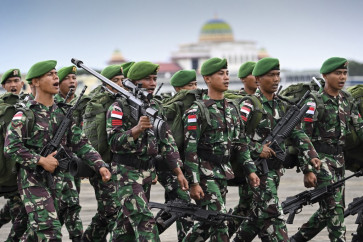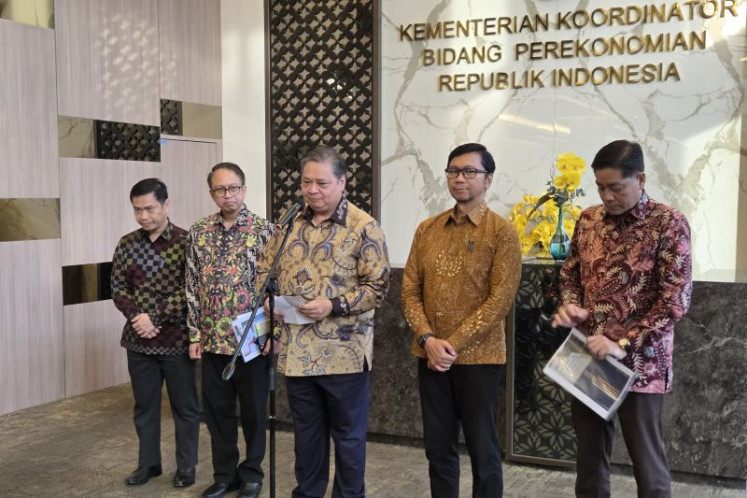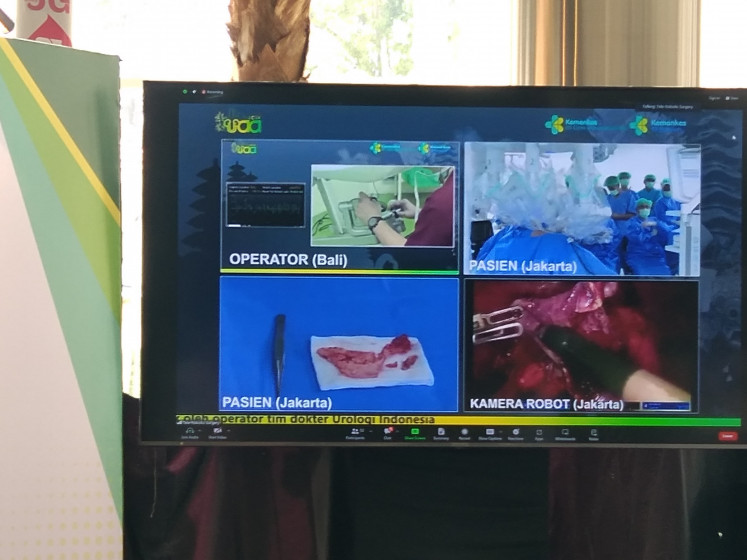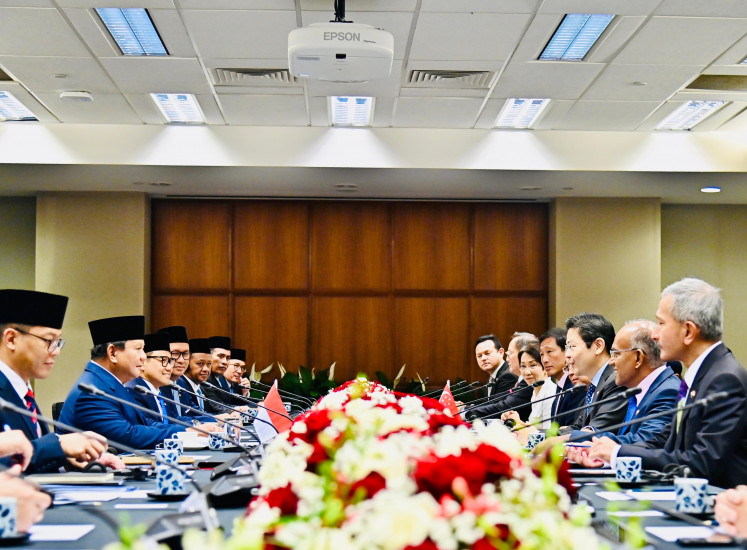Popular Reads
Top Results
Can't find what you're looking for?
View all search resultsPopular Reads
Top Results
Can't find what you're looking for?
View all search resultsAde Armando: Campaign slogans and gears lack of concept
JP/Mariani Dewi The legislative elections are a month away and roadsides in Indonesia are crowded with candidate's posters and billboards
Change text size
Gift Premium Articles
to Anyone

JP/Mariani Dewi
The legislative elections are a month away and roadsides in Indonesia are crowded with candidate's posters and billboards.
So fierce is the competition that some candidates have resorted to putting their family members on their posters, or Photoshopping in images of international faces like football star David Beckham and US President Barack Obama. The Jakarta Post talked to Ade Armando, a lecturer at the School of Social and Political Sciences at the University of Indonesia and a mass media critic about the frenzy.
What do you think about the campaign launched by the legislative candidates?
The fact that mass campaigning can no longer be done in open spaces poses a problem for candidates so the only way they think they can get through is by using the mass media, if they have enough money, and posters, if they do not.
The problem is that the candidates are not people who have built their voter bases in their constituents over the long term. They practically just realized that they need to campaign for themselves *not their party* since the law stipulates that voters choose candidates directly, and not their party. So it becomes important for each candidate to campaign for themselves and this is new to them.
We know that in many other countries the mobilization to gain votes is done over years, like Obama, who has spent years in politics. But they *Indonesia's politicians* seem to be panicking. They use posters and leaflets although this form of media has a low level of outreach.
Aren't the posters seen by many on the street?
But there are so many of them. How do you expect people to remember the faces? So what happen now is panicking - that they have to be seen and heard. Things are not done systematically. In the end they are not effective.
This is not happening in many countries, especially in developed countries, where there are small number of political parties. But for us, there are lots of parties and each party has lots of legislative candidates.
I think the successful ones will not be those who launch campaigns now but those who have built social networks.
So it is not about being flashy?
Their campaigns are not flashy anyway because there are enormous numbers of candidates. Theoretically if everyone is competing, you have to do something extraordinary to gain attention. Perhaps that's why there are many funny posters nowadays.
If you talk about commitment to the people, everyone has already said this. If you say you want to fight poverty, everyone has said so. Unless there is something that is distinctively different, people will not notice. Pretty candidates get the upper hand, but if you are not beautiful, then what?
Some candidates resort to being funny so that people will stop for a moment and laugh. Their hope, of course, is that on the voting day when people open the ballot paper and see hundreds of candidates, they may remember them. But again this is an overly confident hope. How can you hope that your name still rings a bell on the day?
Legislative member are in a very serious position, should people vote for those whose campaign lines can be laughed at?
Let me give you an example. Komar is a comedian, but he was elected as a lawmaker. That means our society no longer base their choice on serious matters. Celebrities become candidates because they know that when people go to the ballot, one of the considerations is *how much I am familiar with this person'. The familiarity is not something serious.
The voter does not think about what to expect from the chosen member, or what will be done on their behalf in the parliament. Especially for legislative election, many voters do not come with a serious orientation.
This is the price we pay in the new system.
I do not say the result will be negative, though. There are so many names there. People may cast their votes not only based on who they know but also who they feel better with. Many may choose comedians, but with the freedom to choose the candidates people may vote for those who have served them.
This process is a step Indonesia must go through. There is no other way. Maybe now people will learn that naturally only few parties can survive, so in the future people will become more rational. So it will be a natural correction.
In the meantime, what are the more effective ways of campaigning?
We know that it is not the campaign that counts, but how someone builds his or her reputation and image over the years before campaigning. We are not talking about once in four years. Say for the 2009 election, whoever has political orientation in mind should start campaigning by building networks.
But perhaps this nation is not used to planning, so many rely on instant results. In this condition, campaigning through media is not very effective anymore. Now they're only left with a 50-50 chance. You cannot afford not to campaign but even if you do campaign you may not get the results you expect.
At this time, media is still the best, the big newspapers, radio and television. In this case, size does matter. If you have money and can have your pictures everywhere, then maybe people will remember.
But I think this is the era where media is not most crucial because there are so many messages by various candidates. So the people who are most likely to win are those who have established a strong base *among the public* over quite a long time.
When they approach their constituents, is there still a risk of money politics?
Yes. We know there are some parties *which do so*. But this *money politics* can be in the form of the construction of public facilities. It is not like in the past when candidates handed out cash. Now candidates have to campaign for themselves, not the party. So, a candidate will have to fork out private funding and it is going to be too expensive for them. If it is for presidency, there is still this possibility.
But if you are known as a philanthropist who has built public facilities or gives cars over the years, there will be a chain reaction. If they can win over the heard of the religious or governmental leaders then the followers will support. It cannot only start now. It is too big - financially and physically.
So the only thing they can do is pray?
It is frightening for them. I have known many candidates who have sold their properties to campaign. It is just like Indonesian Idol where people pay to get votes.
In these kinds of condition, even the political parties with good reputations see their candidates go astray. We also do not know how a candidate gets selected by their party. It is like a big market where everyone can enter with almost no control and in there so much rotten fruit.
We heard about how some sell their house, commit crimes and many other things. The sad thing is that at the end of the day they may not get anything.
There are so many voices and so many promises, are they still heard?
It is an inflation of promises so it is no longer important to promise. The situation is unpredictable but I think this is the time for the rise of people who have a voter base.
Will the prestige of their party help their candidacy?
Yes. When people are so confused by so many names, they will see the party they support. They may just choose the party or the first person from the party on the list although they do not know them. So, being on top of list will help.
I myself do not know who I will vote for. There is no program and I do not know who they are. It comes back to who I chose in the past.
The bribery case involving one of the National Mandate Party's (PAN) top officials has a huge negative impact on them. The media headlines show that PAN official received bribes. Although they tried damage control, the damage has been done.
Subconsciously people realize some other lawmakers are doing it too, but at the front of their minds it's the PAN. I think you can expect that in the weeks to come, other members from other parties will be caught as well.
So in summary, if you want to campaign, do it sooner?
There is a way everywhere. But many think of only the short term. This may be fueled by the uncertainty in Indonesian politics -- people do not think for the long term. Some may think that *why should I build my base for three years if my party in the end kicks me away'. So perhaps this is a process that we have to go through.
Even now for this country, the five year election cycle seems too short. People have no time for visionary programs. They have to get ready to be replaced. If they want to increase their wealth, they must do it in five years because there is no guarantee that they will be reelected.
It becomes a vicious cycle. After this election, people may wait for four years to start again.
Can you imagine that some parties dare not announce their presidential candidates? It shows that everything is uncertain, not visionary. The party can always have plan B but people want to know *their choice*.
If now, in March, they cannot even show how seriously a candidate wants to lead the country, it shows that they do not think in the long term, that they want something instantly and do not want to take risks.
In the next five years, is there anything with the system that should be improved?
It is not the system, but the players. People must stop see being involved in politics as a way to gain power but to see it as a way to build the country, to make things better. But when have we ever had a president who thinks like that?
What we need are politicians who can teach people that politics is about building the country and it is a five-year process whereby, within this time, you have to show your abilities through useful programs, and not fighting.
Is there anything the public can do, rather than depending on the politicians to have the goodwill?
Our people are very simple minded and this is a new system for most people. Some even still need convincing that democracy is the best system.
We can only hope for the middle class. But unfortunately the middle class seems to get involved with political parties. It is harder now to find sectors of civil society that are not affiliated with any parties. It is bad if the intellectuals who fight for democracy all of the sudden stop voicing views of improving the society and begin justifying their *political* leaders.
However, we still have to believe *in this system*. It is impossible to go back to the past oppressive regime. We hope for the best because there is no other. We cannot leave it to the government.









